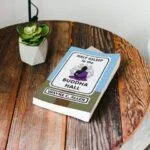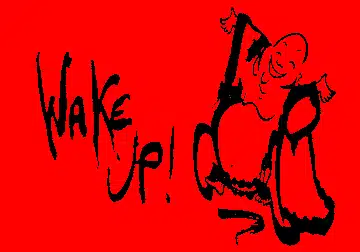Zen and Clarity — learning to see clearly is key to creating peace and focus. Zen offers us many opportunities for clear seeing.

Looking for more on this topic?
Check out my book, Half Asleep in the Buddha Hall.
Wayne’s “Eastern” book takes you by the hand and helps you to find peace of mind. Half Asleep in the Buddha Hall is a Zen-based guide to living life fully and deeply.
I’m continuing the series of articles featuring my peculiar twist about Zen — how a “Simple Presence” approach to life might be of use to you in these most turbulent times.
Zen tends to turn our understandings on their ear, by insisting on the reality of no reality
If you’ve read my book, This Endless Moment, you’ll remember that I wrote that the most important concept to ‘get’ is that there is no real reality.
What this means is that stuff is happening — in the world, in our lives — as we grow, mature, and change. The stuff that is happening, however, has no intrinsic (built in) meaning. It just is.
The way we interpret what is happening is entirely personal AND optional.
The process of interpreting ‘just happens’ as we observe the world around us. We perceive a ‘thing that is happening.’ Our natural process is then to ascribe a category to the thing we perceive.
This is a good thing — we have, for example, a category for ‘hot’ things — like a glowing stove top. It’s great to know that this category applies to all glowing stove-tops.
The trouble comes when we take it a step further, and add in a meaning (an interpretation, or judgement)
This is the realm of right and wrong, good and bad. Should. Shouldn’t.
The words themselves are not the issue. The issue is clinging.
The Buddha said that suffering is caused by clinging. By this, he meant that we get attached.
The attachment is to the “rightness” of our view, and especially do we cling to the “wrongness” of the views of others.
And yet, the things we cling to are stories we’ve made up — fictions — they are not a part of the thing itself.
To wake up is to both understand and accept the intrinsic meaninglessness of everything around us, including the stories we tell ourselves. This is tough, as we have a lot riding on being right. On being smart. On being “the one with the answers.”
We are invested in our stories, and our investment is in our stories, and in the stories we create back up the beliefs we’ve created.
Life discomfort comes when how we interpret events does not match what is actually happening ‘out there.’
And that begs the question: when I feel discomfort, do I blame ‘out there,’ or do I question my interpretation?
Let’s step through our process: we see an event, and rather than stay cleanly engaged with the event per se, we start to run a script based upon stories we have told ourselves in the past.
Example # 1: if I believe that I am incapable of having a meaningful and lasting relationship, this story will colour each and every transaction I have with my partner. If I am not conscious that I have created this story, I will find myself doing two things:
- noticing any event that supports my story, and
- ignoring every instance the denies my story.
Or, I may believe that my role in life is to explain life to my partner or child – to ‘help’ them to ‘see the light.’
Now, if we are talking about a real child – say someone under 12 or so, then yes, our job as adults is to keep the child safe, fed, dry, housed and clothed. We are also responsible for socializing the child, so that he can fit in to the culture to which he belongs.
Where this falls off the rails is when parents continue to parent their adult kids – endlessly interfering with them. “You are not happy, and I have to fix you.”
Or, one spouse decides their partner is ‘a child,’ and the ‘parent’ partner then engages in an endless tirade designed to get their partner to behave (to mind their “mommy.”)
All of this seems reasonable to the person doing this because they think they know best for another. They are unwilling to deal with the actual person – they want the other person to shift so they can be comfortable.
What’s odd about all of this is that the other person typically isn’t asking to be fixed!
And you can’t fix another person anyway. It’s hard enough to fix ourselves.
Example #2: Many people think that waking up is ‘about’ rooting out all that is ‘wrong.’ Typically, such people trap themselves into assigning blame. They are looking to figure out who to blame for their dilemma.
- Parents typically get a lot of blame. “If only my parents had been different, had been better role models, had treated me differently.”
- Partners, past and present, are also blamed. “Why doesn’t she understand? Why can’t he grow up and act right? If only I’d picked better.”
Such reflections lead precisely nowhere. The reflections are based upon stories we tell ourselves, and not upon present reality.
Our first admission needs to be this:
Our memories are notoriously unreliable and self-serving. Our sub-conscious minds ‘selectively pull’ “memories” to support what we already believe!
And even if the story we tell ourselves is essentially ‘true,’ (dad was a jerk and mom was an enabler, or whatever…) so what? Is knowing that likely to change anything in the here and now?
Who you are right now, is … wait for it … who you are right now. There is no way to change one iota of your past. You can’t get a better deal, can’t change your upbringing, nor can you change a single decision you ever made.

What you can do is wake up.
Waking up involves stepping out of the dream.
The dream is the story you tell yourself.
- I’m abused.
- I’m hard done by.
- I’m a victim.
- He is the jerk, I am the princess.
- I have to get everyone to believe my side of the story.
- Everyone hates me / is out to get me.
- How people perceive me is important.
And on and on. The dream is you, living on auto-pilot, repeating the same lame behaviour, day after day, decade after decade. And never, ever, accepting responsibility for your behaviour.
Waking up is seeing the game for what it is, and choosing, repeatedly, to walk another path.
Rather than doing away with our stories (we can’t) we find new ways of thinking and being.
For me, the Zen approach is best. This perspective is very much oriented toward being present without judgement and without preconceived notions. I engage with what is happening now, and in this way my behaviour is relevant to the here and now.
When I take this approach, all that matters is what is going on in this moment.
I choose to let go of the past – all of the ‘trying to fix things,’ all of the ‘assigning blame.’ In this moment, I can choose to see and hear and interact, or I can choose to let the situation or person go, for now or for forever.
I can make that choice based upon where I am right now, as opposed to making the decision based upon the past.
Here’s a quote from Zen Body-Being, by Peter Ralston:
“The success of our actions depends entirely on our ability to relate appropriately to what is actually occurring in this moment.”
And here’s the key:
“Notice that the principle is not based upon what we perceive or experience. This may not make sense unless we recognize that there is a discrepancy between our perception and what is occurring. In short, we can perceive something other than what is there, and fail to perceive what is actually there.” [p 151]
In other words, what we think is going on is just what we think is going on. It’s not what is actually going on.
I remember once, sitting with a couple. The woman told me at great length, and with sighs and tears, what her husband thought about the topic at hand.
I asked her if she was interested in actually asking him what he thought, as he was sitting right next to her. It turned out that she was interested, and asked.
‘Strangely enough,’ he thought exactly the opposite of what she thought he thought! And she’d been mad at him for a week, because she ‘knew’ what he was thinking, and … well, you get the point.
We begin to move past all of this by getting our noses planted on our side of the fence. I do not know what Darbella is thinking, doing, wanting, desiring.
I can tell myself a story and interact with her as if my story is true. Or, I can ask her.
Guess which one works?
